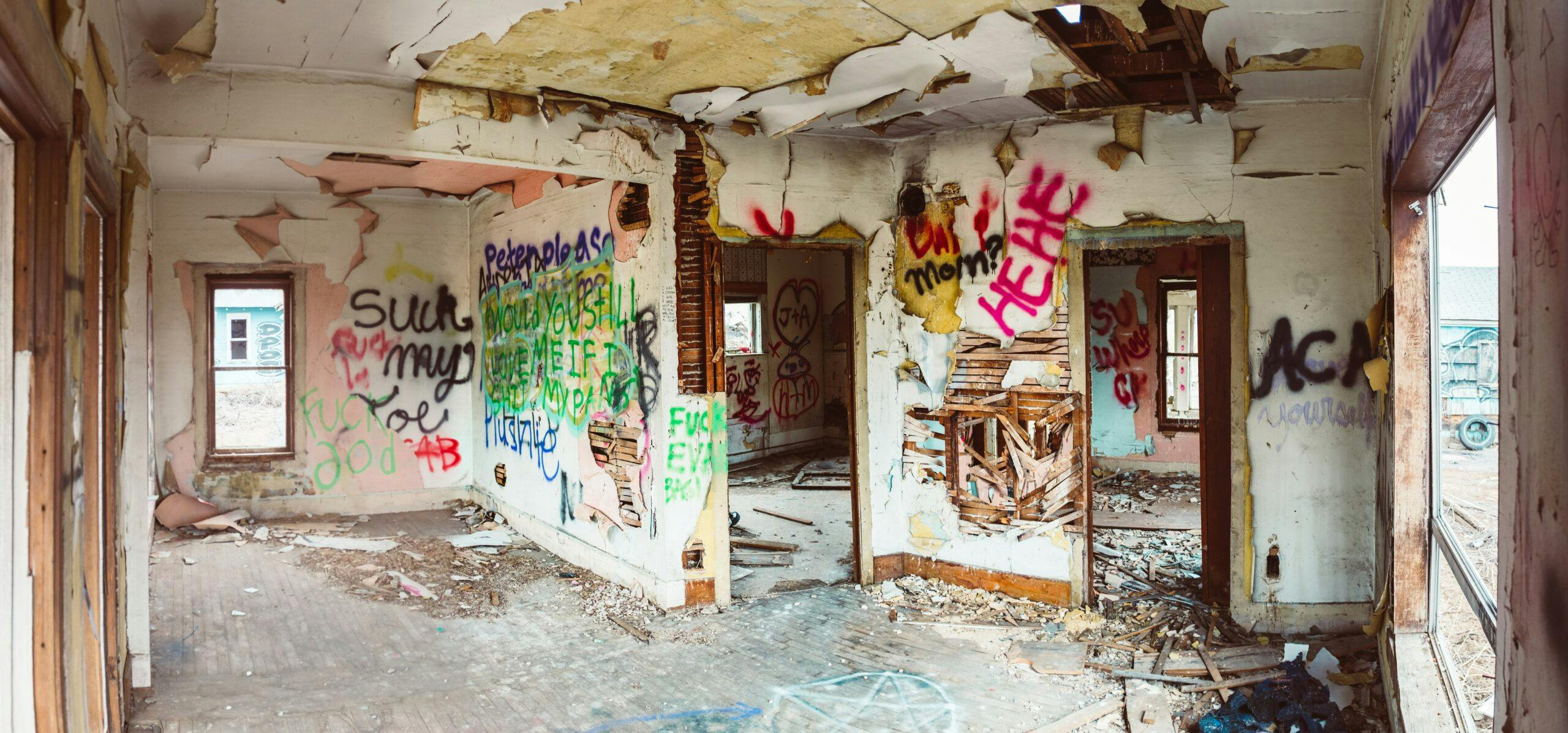Airbnb Insurance: Are You Protected?
By Heidi Unrau | Published on 18 May 2023

Airbnb vacation rentals have been the money-making side hustle dreams are made of. But what happens when that dream becomes a living nightmare? That’s exactly what happened to a Calgary couple who rented out their condo on the popular home-share site. The next morning, Airbnb host Star King woke up to $50,000 worth of damage to her home. Talk about a rude awakening. Airbnb does offer host protection insurance, and of course, you have your own home insurance policy too. But is that enough? You better check your policy before you wreck your policy. Let’s take a look at what Airbnb insurance covers, what it doesn’t, and why you should always keep your home insurance provider in the loop.
What is Airbnb?
It started with two broke roommates and a couple of air mattresses. Now, Airbnb is valued at about $75 billion USD. According to my Wealthsimple Trade app, the price of a single Airbnb (ABAB) share was worth more than a share of Apple Inc (AAPL).
Brian Chesky and Joe Gebbia were struggling to afford rent in pricey San Francisco, California. When the Industrial Design Conference came to town, every hotel room in the city was booked solid with attendees. The roomies spotted an opportunity to make some fast cash. So they bought a few air mattresses, registered the domain name “airbedandbreakfast.com,” and successfully rented to conference-goers unable to snag a hotel room.
Fast forward to today, and Airbnb is a massive online marketplace that matches property owners with travellers looking for accommodation. You can rent either a single room in your home or the entire property itself; the possibilities are endless. And so is the earning potential.
But handing over the keys of your most valuable asset to a complete stranger is risky business. So how does Airbnb incentivize hosts to use the platform? They offer hosts a certain level of financial protection in case best-laid plans go awry.
Airbnb insurance: what’s covered?
As far as free insurance coverage goes, Airbnb is pretty robust. But there are certain limitations you need to be aware of. Just because they offer complimentary coverage, it doesn’t mean you’re protected. Airbnb offers two types of protection for hosts. Let’s take a look:
Host protection insurance
Airbnb offers up to $1,000,000 USD in liability coverage. That means they’ll pay for property damage or personal injury claims made by your guests, neighbours, and condo or apartment building. It acts as your primary insurance coverage.
If claims are in excess of $1,000,000, that’s when your personal home insurance policy would need to cover the rest. According to the Airbnb website, their host protection insurance may cover the following: legal responsibility for your guests and others in cases where something happens at the rented site: injury, damage to personal property, or damage caused to common areas and neighbouring properties.
Host guarantee
The host guarantee differs from the host protection insurance. While host protection insurance pays for claims made by others, it does not cover claims made by you. That means if your own property or personal belongings are damaged by a guest, it doesn’t fall under host protection insurance. Instead, you’ll process the claim through Airbnb’s host guarantee, which covers the cost of damage to your home or personal belongings in the event the guest does not reimburse you.
According to the Airbnb website, their host guarantee may cover the following: the cost to repair damage to your property caused by guests, the cost to replace items or repair damage to your belongings caused by guests, the cost to repair damage caused by a guest’s service animal.
Airbnb insurance: what’s not covered
So you have complimentary protection from Airbnb. Great! But is it enough? Not so fast. What happens if a guest or neighbour sustains serious damage or injury in excess of $1,000,000 USD? Or worse, what if a guest falls down the stairs, sustains a serious fracture or head injury, and is unable to work? What if, heaven forbid, a guest drowns in your pool? You can’t put a price on the loss of human life, a jury will decide that for you. Let’s take a look at Airbnb’s exclusions.
Host protection insurance exclusions
Claim amounts in excess of $1,000,000 USD require supplemental coverage from your own home insurance provider if you don’t have the cash to pay the difference out of pocket. In the event a guest or neighbour suffers an injury that renders them unable to work, Airbnb does not cover lost wages. And possibly the most important exclusion, Airbnb will not cover damage or injury from intentional acts. If it’s not an accident, it’s not covered. And as we already mentioned, host protection does not cover damage to your own home or personal belongings.
Host guarantee exclusions
As generous as Airbnb seems, there are exclusions meant to cover their bottom line. Your host guarantee does not cover damage or injury suffered by your guests, neighbours, or others. That will fall under your host protection insurance and is capped at $1,000,000 USD.
The guarantee does not cover damage to your property caused by normal wear and tear, nor will it cover theft of cash or securities like bonds or stock certificates. Nor does it cover things like jewelry, certain types of art or collectibles. So if your entire life savings is stuffed under your mattress, it’s time to deposit that cheddar in a bank account. Or, you know, invest it. The same goes for that rare crystal egg proudly displayed on the mantle. Put it away, lest you get caught up in some risky business.
Airbnb insurance: other considerations
Despite having some pretty generous protection, you could still be at a loss, even if the claim falls within Airbnb’s coverage inclusions. What do I mean by that? Well, if your stuff gets damaged, don’t expect to be covered for the full replacement cost. Airbnb is more likely to go by the actual cash value; meaning they take depreciation into account.
So if your Airbnb guests ignore your coasters and cause significant water damage to your $2,500 West Elm credenza that you bought four years ago, you won’t be reimbursed for what you paid for it. Airbnb will likely pay out the current cash value of a comparable piece of furniture of similar age and condition. Used furniture does not hold its value.
If you’re lucky enough to have a popular listing, you may not have time to make a claim before the next guest checks in. That could complicate things for you. Sometimes a blessing can also be a curse. If you cancel a booking it will cost you money, and probably your Airbnb host rating too. If you have back-to-back bookings, you may not have enough time to submit your claim. That can blur the line between who caused what damage, when and how, which could void your host protection coverage.
Airbnb insurance: why you should tell your home insurance provider
Airbnb host protection and guarantee coverage is a pretty sweet deal, I’m not going to lie. But there are some serious limitations that can’t be ignored. If you assume your own home insurance policy will automatically fill in the gaps, you could find yourself up a creek without a paddle.
If you rent your home out on Airbnb, you’ve just converted it into an income property, full stop. It doesn’t matter if you only plan to rent out that extra room one time, or if you rent out the whole place on a regular basis. During the time a paying guest occupies your space, you’ve changed the terms of your home insurance policy. That’s something your provider needs to know about.
For some home insurance providers, pay-to-stay arrangements actually void your entire policy. That means you’re not covered for anything, period. Other insurance companies will make a note on your policy. But usually, most of them will require you to make a material change to the policy which will increase your monthly premium. Depending on your particular goal with Airbnb, you may even need a new, special kind of policy altogether.
If you plan to host on Airbnb, you’ll need to shop around for insurance quotes. And make sure you read the fine print. Some providers may say they cover home-share arrangements, like Airbnb or VRBO, when they really mean long-term tenants rather than short-term rentals. You’ll need to drill down into the fine print to understand the scope and restrictions of your coverage.
Airbnb hosting: who offers short-term rental insurance?
Airbnb has taken North America, and the world, by storm. Many insurance companies noticed both the gap and profit potential in the emerging short-term rental market. Below is a non-exhaustive list of Canadian insurance companies that provide short term rental insurance:
- Zensurance (commercial insurance for those who rent out AirBnBs as a business)
- April Insurance
- Aviva
- Duo
- SquareOne
Before you sign on the dotted line, make sure you have the right coverage for your needs at the best possible price. Start by using the Hardbacon insurance comparison tool to get quick quotes and fast service from a variety of insurance providers. It pays to shop around.
